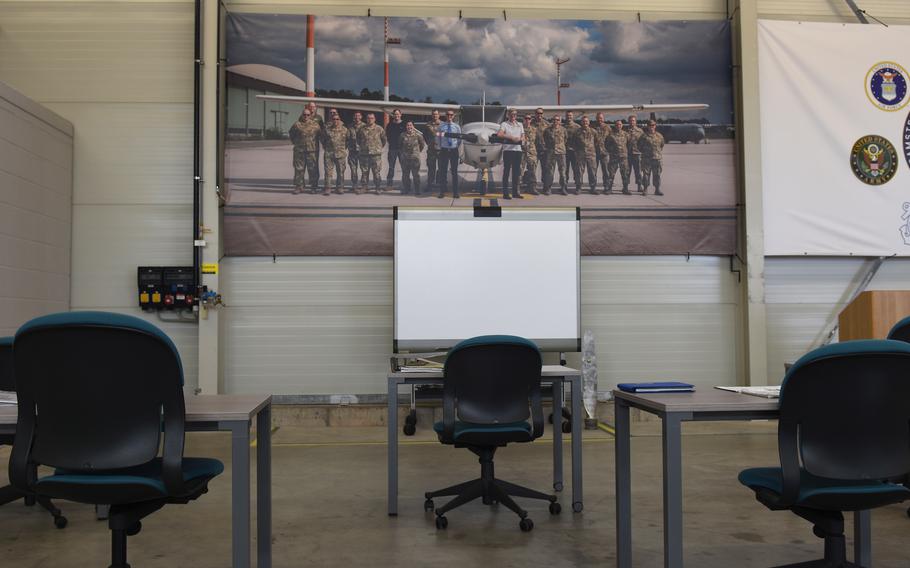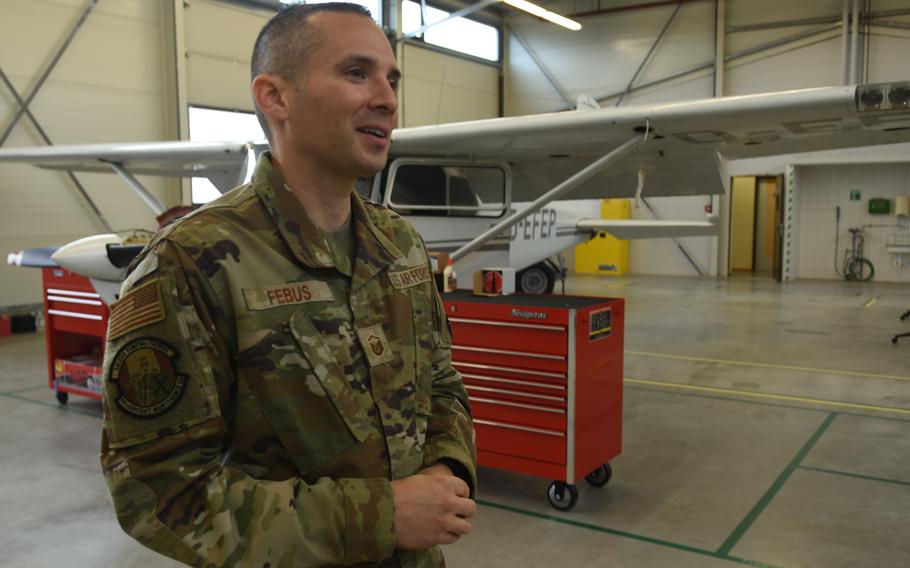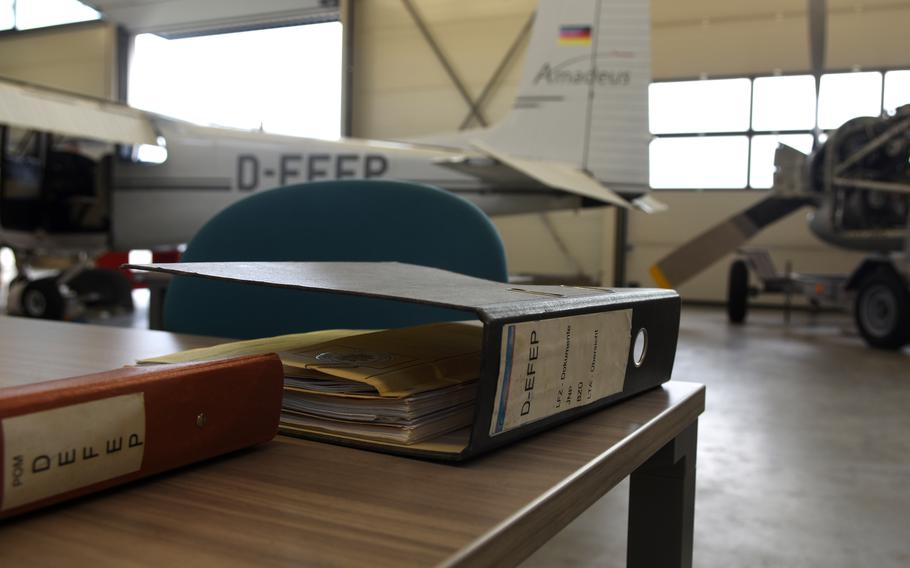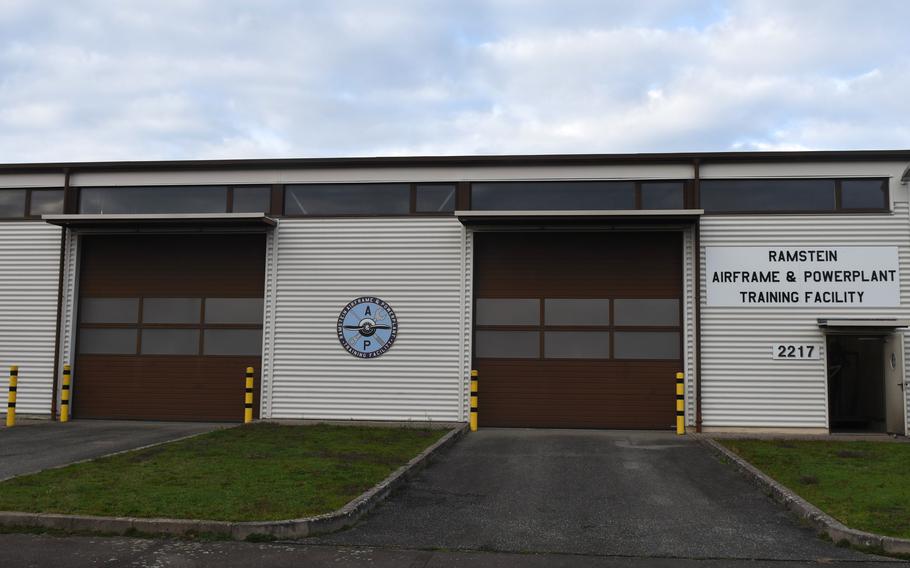
The schoolhouse inside the new Airframe and Powerplant training and testing facility at Ramstein Air Base, Germany, Nov. 15, 2022. The Federal Aviation Administration certified the center Wednesday, the first such training program of its kind overseas and on a U.S. military base. (Jennifer H. Svan/Stars and Stripes)
Obtaining certification to work as a commercial aircraft mechanic should no longer pose a logistical challenge for military maintainers based in Europe, thanks to a new program at Ramstein Air Base.
The installation in Germany is standing up the first Airframe and Powerplant testing and training program overseas.
A team from the Federal Aviation Administration certified the training facility Wednesday, making it the only one of its kind on a military base worldwide, Ramstein officials told Stars and Stripes on Wednesday.
The program closes the gap between military maintainers’ training and FAA eligibility requirements for the same job in the civilian world. It also can broaden maintainers’ skills while they’re still in the military, officials said.
“This is one of the most sought-after certificates in the maintenance community … across all branches of the military,” said Master Sgt. Jaime Febus, a production superintendent with the 86th Aircraft Maintenance Squadron, who spearheaded the initiative to establish the Ramstein program. “It’s one of the main reasons that this is such a big deal.”

Master Sgt. Jaime Febus, a production superintendent with the 86th Aircraft Maintenance Squadron, talks about the new Airframe and Powerplant training and testing facility at Ramstein Air Base, Germany, Nov. 15, 2022. Febus was instrumental in standing up the program, the first Federal Aviation Administration certification program for aviation maintenance overseas and on a U.S. military base. (Jennifer H. Svan/Stars and Stripes)
With backing and funding support from the 86th Airlift Wing and U.S. Air Forces in Europe-Air Forces Africa and other units, a building was converted into a training facility and stocked with tools, training materials and aircraft equipment, including a Cessna 172 Skyhawk trainer purchased from a German flying club.
A&P mechanics are responsible for certifying aircraft for flight and ensuring the safety of all parts, such as the fuel tank, main body, engine and landing gear, among other tasks.
A certificate can be earned through an FAA-approved aviation maintenance school, which can take 18 to 24 months. But those already working in the field, such as military maintainers, can leapfrog the schooling and go through a certification program.
Febus began his efforts to establish the Ramstein facility about three years ago.
“When I started talking to my airmen, ‘Hey, what is the one thing you seek to achieve while you you’re out here,’ it was getting an A&P certificate,” he said.
Febus also wanted them to avoid the difficulties he experienced. He spent about $7,000 of his own money to fly back stateside to get certified.
Right before he took his oral test for certification, the school shut down because of the pandemic, he said. He never recouped his money or received his certificate.

Training manuals sit on a desk inside the new Airframe and Powerplant training and testing facility at Ramstein Air Base, Germany, Nov. 15, 2022. The Federal Aviation Administration certified the center on Wednesday, the first such training program of its kind overseas and on a U.S. military base. The program enables military maintainers to get a professional license they can use to work on planes in the civilian world. (Jennifer H. Svan/Stars and Stripes)
To be eligible to participate in the program at Ramstein, service members must provide proof of aviation experience and complete a written exam. The program includes a week of practical hands-on training, Febus said.
Ramstein is working with instructors at Embry Riddle Aeronautical University to lead the course.
“They’ll be taught skills such as shooting rivets, operating a torch, bending metal, repairing blades, a lot of things you can’t learn from reading a book,” Febus said.
Costs of the training are still being determined, but the military typically pays for professional certification in a person’s career field, Febus said. In the Air Force, the cap is $4,500, he said.
In the second week, an FAA proctor will administer the test for certification. There’s only one authorized examiner currently in Europe working for the FAA, an American residing in Germany, Febus said.

The new Airframe and Powerplant training and testing facility at Ramstein Air Base, Germany, Nov. 15, 2022. The Federal Aviation Administration certified the center on Nov. 16, the first such training program of its kind overseas and on a U.S. military base. (Jennifer H. Svan/Stars and Stripes)
The test, which can take from eight to 12 hours, includes oral questions and a practical task, such as starting an aircraft or doing a compression test on an engine, Febus said.
The goal is to open the facility to the first students sometime in March, Febus said.
The training is available only to active-duty members of any branch of the armed forces, but any U.S. citizens with base access may arrange to test for a certificate at the facility.
For information on the program, email ramsteinairframeandpowerplant@gmail.com.